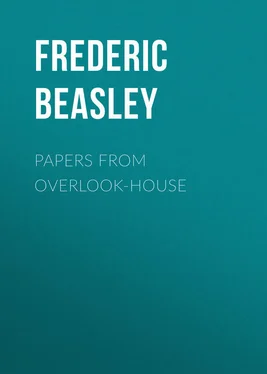Frederic Beasley - Papers from Overlook-House
Здесь есть возможность читать онлайн «Frederic Beasley - Papers from Overlook-House» — ознакомительный отрывок электронной книги совершенно бесплатно, а после прочтения отрывка купить полную версию. В некоторых случаях можно слушать аудио, скачать через торрент в формате fb2 и присутствует краткое содержание. Жанр: foreign_antique, foreign_prose, foreign_poetry, на английском языке. Описание произведения, (предисловие) а так же отзывы посетителей доступны на портале библиотеки ЛибКат.
- Название:Papers from Overlook-House
- Автор:
- Жанр:
- Год:неизвестен
- ISBN:нет данных
- Рейтинг книги:4 / 5. Голосов: 1
-
Избранное:Добавить в избранное
- Отзывы:
-
Ваша оценка:
- 80
- 1
- 2
- 3
- 4
- 5
Papers from Overlook-House: краткое содержание, описание и аннотация
Предлагаем к чтению аннотацию, описание, краткое содержание или предисловие (зависит от того, что написал сам автор книги «Papers from Overlook-House»). Если вы не нашли необходимую информацию о книге — напишите в комментариях, мы постараемся отыскать её.
Papers from Overlook-House — читать онлайн ознакомительный отрывок
Ниже представлен текст книги, разбитый по страницам. Система сохранения места последней прочитанной страницы, позволяет с удобством читать онлайн бесплатно книгу «Papers from Overlook-House», без необходимости каждый раз заново искать на чём Вы остановились. Поставьте закладку, и сможете в любой момент перейти на страницу, на которой закончили чтение.
Интервал:
Закладка:
I.
DR. BENSON, OR THE LIVING MAN EMBALMED FOR TWENTY YEARS
The United States is the oldest country in the world. Many of its institutions are of a venerable antiquity which cast those of Europe into the shade. By their side those of Great Britain, France and Germany seem but of yesterday. The honest impressions of each man substantiate these assertions so clearly that all argument on the subject would be as great a work of supererogation as that of carrying shade to a forest. Ages, countless ages, as all reflecting men are aware, have been requisite for the development of man into the highest type of civilization. Not less, it is obvious, than five thousand years could elevate any human being into a genuine Yankee. Such an immense space of time must have elapsed before man, passing through each primeval epoch, could have worn away on Plymouth Rock the caudal appendages that impeded the progress of humanity.
We have such remarkable institutions among us, such progressive theorists upon all possible subjects, that the foundations of our cities must have been laid simultaneously with those of the Pyramids.
A like conviction arises as we compare our accomplished financiers who can raise up in any plain, mountains of gold, and turn little streams of promise into seas of bank notes, with the Indian magician whose alchemy transmuted mutterings and strange figures in the ashes into comfortable fires, venison, bear's meat, and a variety of comforts for his terror-striking wigwam. Are there not noted streets in our cities where some men have discovered the philosopher's stone?
And then look on the systems of our modern politics. Each man can see what glacier periods have been over the land, what thickness of ice impenetrable to pure rays from above, melted from beneath, ice which has ground down to dust the ancient heights of honor, of modest nature distrusting itself. Yes, we are the oldest people in the wide world.
Even the little village where my history directs our attention has one savor of dignified antiquity. It has had a long series of names in no rapid succession. Our antiquarians have not paid sufficient attention to this subject of the succession of such names borne by our villages and towns. One cause is our nervous apprehension, that such a study will reveal a former state of society which people of strong prejudice may not mention to our honor. Citizens who have long purses acquired in the sale of farms divided into town lots, who have highly educated and refined children, do not wish any one to contradict them while they intimate their illustrious descent, by saying that they remember when their father or grandfather dwelt at Scrabbletown, Blackeye or Hardcorner. The honest truth is that these names of these rural towns do indicate the transmigration of the souls of the places into different social forms. They often tell of the original solitude, the cluster of poor dwellings of men a little above the Indian, of small taverns springing up as the devil has sown the seed, of the free-fights, of the loose stones in the roads, the mud immeasurably deep, of the reformation with the advent of the itinerant preacher, of the church, of the school-house, of the rapid progress in general prosperity. In place of yielding to the seductive influence of the disquisition which offers itself to my toil, I shall consider it sufficient to say of our village that it was honored by becoming the residence of Dr. Benson. It is sufficient for me to inform my reader that at the time when my history commences his fame and occupation gave the title to the place. Indeed, in his honor it bore successively the names of Pill-Town, and Mortar and Pestle city.
His general history was not one that is uncommon in our land. Many a man of small education, but who has had a natural turn for the study of simple means for the cure of ordinary diseases in a country neighborhood has acquired considerable skill, and done more good, and far less evil, than could have been anticipated. In fact the ignorant often lean on such a man with special confidence. They prefer his services to those of the well-taught and meritorious physician. For they think it easily explicable, that the learned doctor should often cure the diseased. Books have taught him what medicines are needful for those who are sick. But around the quack there is a delightful cloud of mystery. His genius was surely born with him. He has stumbled on his remedies by some almost supernatural accident. And then there is the exciting and most pleasant doubt whether he has not had some dealings with the devil. You have moreover this advantage, that you acquire all the benefit of his compact with the evil one, without any guilt on your part. All that is evil lies on the head of the practitioner.
How noble the calling of the true physician! What more need we say of his office than that in every sick-room he can look to the Redeemer, and feel that he employs him to do, what he was continually doing by his own words when he was on the earth? "Without the power of miracles," – I quote from memory words that fell from the lips of one very dear to me whose voice is no more heard on earth, and I fear I mar the sentence, – "Without the power of miracles, he goes about doing good, the blessed shadow of our Lord; and by him God gives sight to the blind, hearing to the deaf, enables the lame to walk and raises up those almost fallen into the sleep of death."
As I write, the manly form of our family physician, the form that we laid in the grave a few years ago, rises before me. Oh! what unselfishness, what high sense of honor and professional duty, what compassion for human infirmities, what a grand and enduring perception of the brotherhood of man, of the one family of rich and poor, learned and ignorant, didst thou then learn, our dear kind friend, in thy innumerable ministrations! Literary men have too often indulged in cheap humor at the cost of the physician. It is easy to caricature anything grand and sacred. It is easy to cure in the pages of the novel the sick man who plays his pranks at the expense of the doctor, and eats his meat, and drinks his wine when the medical advice assures him that he must fast or die. Just imagine one of these literati to send for his physician in haste.
"Doctor," he exclaims, "it is well you have come! Do give me some relief."
"Wait a moment," exclaims the physician! "I have something to read to you."
"Read to me, doctor! Why I am ill, – alarmed. Depend upon it, I am very sick. Prescribe for me at once."
"Prescribe for you! Why hear what you wrote concerning physicians. If they are what you describe, you should never ask them to come near your sick bed."
"But I wrote only in jest. I described the pretender."
"No, my dear sir, your assault is without limitation. Your attack is against all men of my profession. Your words were adapted to aid the ignorant popular prejudice against our art. I will read to you."
I cannot but think that, in such a case, there are not a few writers of light literature, who would be forced to perceive the meanness of their assault on a noble profession.
Our hero commenced his public career in a blacksmith's shop, where he gave assistance in the useful work done by his master on the anvil. There he displayed a curious talent for healing the diseases of the horses, which the farmers brought to the place. This gave him some notoriety. And he never was sent for to heal as a veterinary doctor, on any occasion, when he did not have the confidence of a man whose eyes pierced far through the skin, and saw the secret causes of disease.
A change in his fortunes occurred, when a skilful physician, who fled from France in a time of great political trouble, came to reside in his neighborhood. All the spare time that our hero could command he spent in serving him in his fishing excursions – rowing his boat for him, and pointing out the best places where he could cast his hook – an act that seemed to be his best solace as an exile. The good stream or lake that well repaid his skill and patience in the use of his rod, was almost to him for a season, a Lethe between him and beautiful France.
Читать дальшеИнтервал:
Закладка:
Похожие книги на «Papers from Overlook-House»
Представляем Вашему вниманию похожие книги на «Papers from Overlook-House» списком для выбора. Мы отобрали схожую по названию и смыслу литературу в надежде предоставить читателям больше вариантов отыскать новые, интересные, ещё непрочитанные произведения.
Обсуждение, отзывы о книге «Papers from Overlook-House» и просто собственные мнения читателей. Оставьте ваши комментарии, напишите, что Вы думаете о произведении, его смысле или главных героях. Укажите что конкретно понравилось, а что нет, и почему Вы так считаете.












